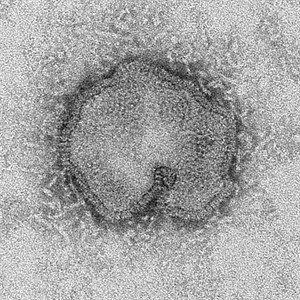
The H7N9 bird flu virus is shown under an electron microscope in a handout photo. THE CANADIAN PRESS/HO-Centre for Disease Control and Prevention
Republished January 30, 2015 - 5:56 AM
Original Publication Date January 29, 2015 - 8:40 PM
TORONTO - A British Columbia man suspected of having been infected with H7N9 bird flu has tested positive for the virus, the deputy provincial health officer said Thursday.
The unidentified man is the second Canadian known to have been infected with the virus.
On Monday, provincial and federal health authorities announced that a woman — the man's wife — was diagnosed with North America's first case of H7N9 flu.
Additional cases are not expected to arise from this event, Dr. Bonnie Henry, B.C.'s deputy provincial health officer said via email.
"No other contacts are ill and are now past the incubation period so we do not foresee any further cases," she said.
The couple are believed to have contracted the virus during a recent trip to China. They returned on Jan. 12.
The man became ill about a day before his wife but did not seek medical care. When the woman developed the same flu-like symptoms, she went to her family doctor who tested her for influenza.
Testing at the provincial laboratory at the British Columbia Centre for Disease Control revealed the woman was infected with an H7 virus, which is not one of the flu subtypes that normally infect people.
A sample was sent to the Winnipeg lab, which confirmed the virus as a H7N9 flu.
H7N9 is a subtype of flu that infects poultry. But in March 2013, authorities in China reported several cases of human infections.
Since then, roughly 500 human infections have been diagnosed, all either in China or in people who had travelled to mainland China, Hong Kong, Taiwan and Malaysia have all diagnosed infections in returning travellers.
Roughly a third of the people who have been diagnosed with this infection have died from it.
When it became apparent what the woman was infected with, public health officials tested the husband.
The couple, who are in their 50s, were not sick enough to need to be hospitalization. But their symptoms were such that they did stayed home and had little outside contact at the height of their illness.
They have both since recovered.
News from © The Canadian Press, 2015